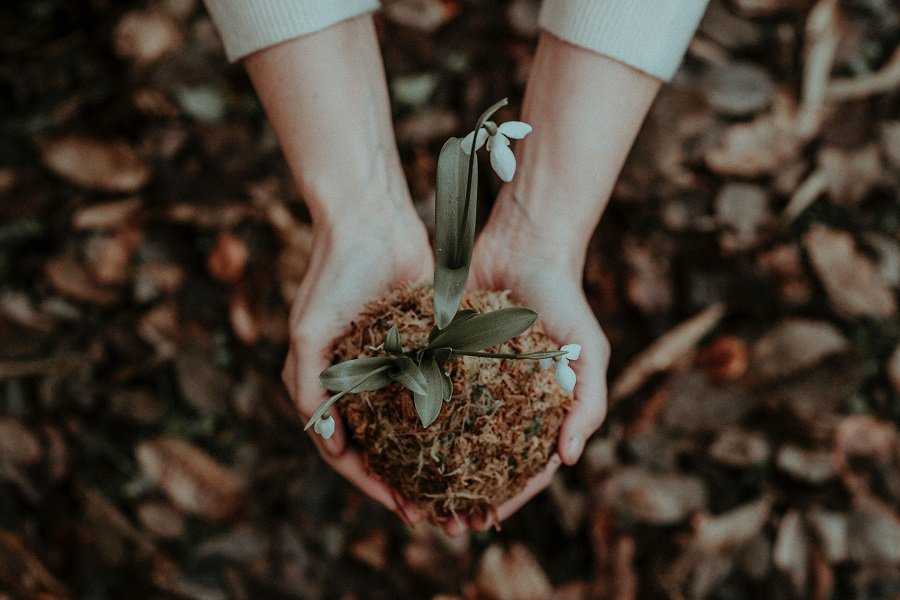5 Principles of Conscious Gardening
Have you ever wondered how you benefit from plants? Plants are beautiful beings that all the time are helping us to improve our lives, many times. We take them for granted, and we should stop to reflect on their importance for our planet Earth and us.
We could also thank them and give them back for their excellent work. Plants not only allow us to breathe fresh air, but they are also the basis of our food and medicine, not to mention that they are ideal when it comes to beautify or decorate any space. And if you like to beautify your home with plants, you’ve probably wondered how you can take care of them to keep them beautiful.
The most important thing about gardening at home, or in any indoor space such as an office or commercial space, is to understand the needs of your plant friends and treat them like living things to help keep them healthy and in balance.
It seems that lately, many of us are interested in caring for the planet, in eating consciously, in dressing with natural fibers, in avoiding chemicals and taking care of our health naturally, in beautiful spaces full of life, and in nourishing our spirit with the contemplation of nature to achieve all this, plants become our best allies, so we must appreciate them as such and take care of a symbiotic and reciprocal relationship with them. Gardening is one way to relax. For inspiration, before I write my papers about gardening, I take care of my plants in the garden. For this reason, we share with you this reflection on the principles of conscious gardening.

1. Symbiosis
The relationship between humans and plants should be symbiotic (symbiosis; intimate association of organisms of different species to mutually benefit each other in their essential development). It is crucial to recognize and appreciate that plants benefit us in countless ways, so we should also help them, to thank them in some way for what they give us, and thus build a reciprocal relationship with nature. If a plant gives me so many benefits, how can I repay it? You can give it back by giving it love, understanding its needs, and supplying it with what it requires to be happy.
2. A plant is a living being
A potted house plant is no different than a pet. It is a living being that is somehow forced to live under certain conditions that are not natural. It is a captive plant that cannot forage for its food when it runs out of the soil in which it is planted. So if you have a plant, you have a responsibility to supply it with the necessary nutrients and conditions. As with all living things, the basis of a plant’s balance is to stay nourished and hydrated, avoiding any excess. If you have or want to have plants, you are responsible for that balance.
3. Identify your plant’s needs
Plants have different needs for soil, light, irrigation, air humidity, and nutrients. Identify the name of your plant, its origin, its natural habitat, then try to simulate it by choosing the most suitable for planting. Also, make sure when you buy a plant in a nursery that it does not have any deficiency, pest, or symptom of disorders in its leaves (such as spots, burns, or malformations) because if you buy a sick plant, it will be challenging for it to adapt to your space.
To identify the needs of your plant, think about where it grows naturally, for example, a fern grows naturally in the undergrowth (vegetation formed by plants and shrubs that grow under the trees of a forest), which means that it likes a shady and humid environment, a peaty substrate and frequent watering, surely it will not enjoy too much direct sun, dry climates and lack of watering. Before choosing the location of a plant, the important thing is that the conditions of the space are suitable for the plant, not only where it looks pretty to satisfy your preferences, but more importantly, place it where it will be happy and can develop healthily.
4. Gardening is about time and patience
A plant is not a decorative object. It is a living being that requires your attention and care. House plants slowly adapt to new spaces and conditions. You must be patient. A plant invests all its energy in producing fresh leaves and flowers. So respect and value that work and that time, understand that a healthy plant will look good and grow fast, but a plant that is not in balance will produce very slowly, or maybe it will not grow and will eventually die. Having plants at home requires time and care. You must be willing to give your plants some of your time (this is part of the retribution). The time depends on the number of plants you have, but let’s say that you should at least dedicate some time, a couple of times a week, to water them (only if necessary), check their leaves, and give them affection. We advise you not to have more plants than you can adequately care for.
5. Intuition and connection
Gardening is as diverse as nature and its ability to adapt. There are no exact laws that tell you when to water each plant and how much water to give it since there are many variables such as the type of plant, the climate, the material of the pot, etc. Common sense and intuition can be good advisors. Learn to listen to your plants, take the time to observe them, the color of their leaves, their vitality, their brightness, and texture. All these are indicators of how a plant feels. Ask yourself what you would like if you were a plant, connect with them, observe them, admire them, thank them, care for them and give them love.
Conclusion
“If you want to be happy for a lifetime, plant a garden,” says a wise Chinese proverb. Dedicating love to the garden is the noblest thing you can give yourself and life itself. It is a celebration in honor of existence.
Elissa Smart is an omnipotent demiurge behind PaperHelp’s blog. Driven by seething creativity, not only she helps students with particular research and writing requests, but also finds the energy to share her extensive expertise via blog posts.
